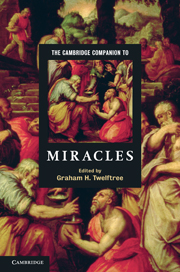2 - The meanings of miracle
from Part I - Fundamental issues
Published online by Cambridge University Press: 28 May 2011
Summary
I take a miracle to be: (1) an event which would never have occurred except through the action of a transcendent rational agent, (2) an event that has religious significance in the sense that it can reasonably be viewed as furthering God’s purposes and (3) an event of such an extraordinary nature that it is either directly perceived as a supernatural intervention in the normal order of nature or immediately inferred as such. If such events occur what do they mean for science, philosophy and theology?
MIRACLES AND SCIENCE
A common view is that miracles, so defined, necessarily involve violation of the laws of nature. The assumption seems to be that the only way a supernatural overriding of the normal course of nature can take place is by violating some law of nature. If this assumption is correct two problems arise.
First, it is not clear that the concept of a law of nature being violated is logically coherent. Three major types of theories are proposed as accounts of the laws of nature: (1) regularity theories, (2) nomic necessity theories and (3) causal dispositions theories. On all these theories the concept of a violation of a law of nature is problematic.
On regularity theories, laws of nature are universal generalizations made on the basis of, and summarily descriptive of, what actually happens in nature. Such theories imply that no event could violate a law of nature, since laws of nature are understood simply to describe what actually happens.
- Type
- Chapter
- Information
- The Cambridge Companion to Miracles , pp. 36 - 54Publisher: Cambridge University PressPrint publication year: 2011
- 2
- Cited by



